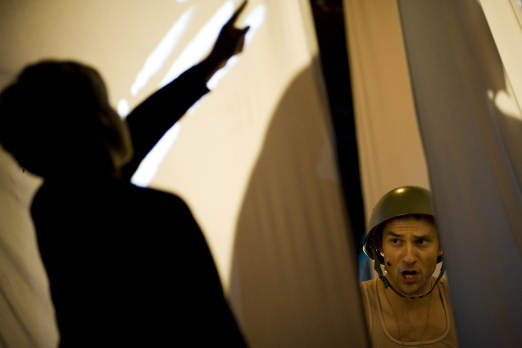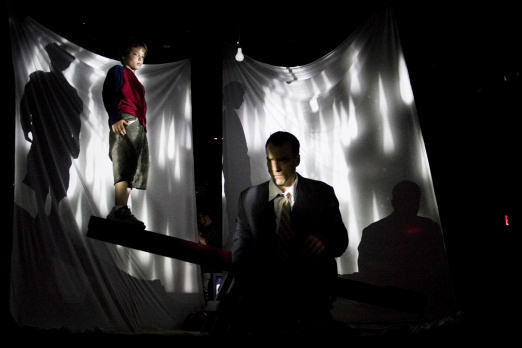Other Links
Editorial Board
- Editor - Bill Kenny
- London Editor-Melanie Eskenazi
- Founder - Len Mullenger
Google Site Search
SEEN
AND HEARD INTERNATIONAL CONCERT REVIEW
David T. Little: Soldier
Songs: David Adam Moore (The Soldier),
Brandon Rakowski (The Boy), Todd Reynolds (Conductor), Newspeak
Ensemble. Le Poisson Rouge, New York City, 7.9.2008 (BH)
David Adam Moore: The Soldier
Brandon Rakowski: The Boy
Todd Reynolds, Conductor
Newspeak Ensemble
James Johnston, Piano/Synthesizer
Eileen Mack, Clarinets
Brian Snow, Violoncello
Yuri Yamashita, Percussion
Special guests:
Kelli Kathman, Flutes
Andrew Tholl, Violin
Yuval Sharon, Director
Chisato Uno, Set and Costume Design
Lucas Benjamin Krech, Lighting Design
Corey Michael Smithson, Animation and Video Design
When I enter combat, in my Abrams
Tank,
I like to bring my iPod, to keep me entertained.
When I enter combat, in my Abrams Tank,
I listen to Metallica to keep me in a rage.
-- From "Still Life with Tank and iPod (Age
22-24)" from Soldier Songs
As a composition student, David T. Little recalled bringing an
angry anti-war work to one of his teachers who counseled, "You know,
I don't need a piece of music to tell me that war is bad," and it
was good advice. Instead, in Soldier Songs Little focuses on
the larger issue of what war does to fighters and those who might
be, to brothers, fathers, sons and friends, to the bonds that we
forge over time. The result can make one squirm.
Presented at Le Poisson Rouge, one of the New York's newest venues
(former site of the Village Gate), the spare production placed the
audience surrounding Chisato Uno's set, a sandbox with a brown
seesaw in the center. Later in the evening, white sheets rose on
all four sides, evoking tents, which director Yuval Sharon
effectively transformed into canvases slashed with blood. Uno's
costumes for the two characters were simple: the Soldier in
sand-colored briefs and t-shirt before donning a dark suit later in
the piece, and the Boy in simple pants and shirt, as if he were off
to the park to play baseball.

Among an army of young composers, Little is one with omnivorous
influences, including heavy metal, electronics, and musical theater,
and Soldier Songs exists in two versions: one for orchestra (presented last spring
at New York City Opera's Vox series) and the one here, for baritone
and amplified chamber orchestra—here the Newspeak Ensemble,
impressively conducted by Todd Reynolds. The result, in eleven
sections, alternates between grinding machine-like noises and more
lyric interludes, with taped texts culled from veterans interspersed
like numb commentary. Musically, the texture is just as likely to
flare up in a wall of sound before dying out in a trail of soft
ticking sounds.

Aside from evoking playground innocence, the seesaw was used in
other ways, such as when the Soldier and the Boy, played by David
Adam Moore and Brandon Rakowski, are at either end, eyeing each
other, often off-balance. Sometimes the plank seemed like a bridge
between the two; at others it appeared to highlight their
differences. One is trained to fight; the other is trying to learn
from what he sees. When the Soldier strangles or shoots, the Boy
does the same, his actions mirroring those of his mentor in uneasy
symmetry. Moore, singing with discomfiting intimacy, was in
powerful voice, his rich sonority capturing pain, regret, and even a
bit of surprise, as if he couldn't quite grasp what kind of person
he had become. Soldier Songs has the force of emotions
tossed around, allowed to bruise each other and then served up raw.
Bruce Hodges
Photos © Jane
Kung
Back
to Top
Cumulative Index Page
